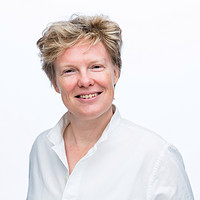VehGro student team wins exciting Blockchain Challenge
The Saxion Blockchain week is over! Last week, eight student teams took part in the Blockchain Challenge. The challenge was to come up with blockchain solutions for issues at play in trade and industry. Last Friday afternoon Joris Hartman, Michel Koop, Pim van Kaam and Tim van Ast became the proud winners of the Challenge. The School of Finance & Accounting students came up with a blockchain solution for VehGro, a wholesaler in organic food.
The students progressed towards the final in an exciting and intensive week. Last week, we took a peek in the ‘Ketelhuis’ (boilerhouse) on the premises of the Deventer Gasfabriek (gas factory), which symbolically served as a pressure cooker in which the blockchain solutions were prepared.
On Thursday afternoon, 16 January, there were lots of people milling around: the Ketelhuis was completely packed. Students were standing around flip-over charts, sitting behind laptops or following a crash course in delivering a good pitch. Lecturer-researcher Arthur Janse was present and satisfied with how things were going: “These eight teams consist of students from very diverse Saxion degree programmes, ranging from HBO-ICT to Applied Psychology and from Hotel Management to Commercial Economics. What unites them is the challenge to come up with the very best blockchain solution for their client. In this way, they make a concrete contribution towards improving a business process or solving a problem. It's great to see the teams at work."

The winning team!
To establish a clear link between vacancies, available talents and relevant companies, we are developing a blockchain solution that can generate potential matches on an anonymous basis and present these via an app or website.
Together with their team, Martijn van de Kuilen (Commercial Economics) and Marit Oortwijn (Hotel Management) are in the process of developing a blockchain solution for Deventer Information City (‘Deventer Informatiestad’). Marit recounts: “Our client works together with ten Deventer companies that are looking to recruit a total of around 2,000 IT experts. Posting vacancies or hiring recruiters has thus far not resulted in the recruitment of sufficient new staff members. That is why the companies decided to mutually exchange their own staff on a project basis. To establish a clear link between vacancies, available talents and relevant companies, we are developing a blockchain solution that can generate potential matches on an anonymous basis and present these via an app or website.” Martijn adds: “In this way, companies may hire out their staff to other companies for a number of hours per week. At a number of companies, applications are already running on a blockchain, but we establish an extra link to a user-friendly solution that truly benefits end-users. Thus, technology can help solve an urgent problem."
A little further down the room Marijn van der Graaf (Public Administration) and his team are sitting around a table full of laptops and hand-drawn mindmaps: “We are developing a solution for Delta Wonen, a Hengelo-based company. Housing associations are required to have up-to-date and verified data at their disposal to make the right rental properties available to the right candidates. Incorrectly submitted income data will result in extra administrative activities or a delay in the administrative processes. If Delta Wonen would be able to have this type of data checked automatically via a blockchain application, it could structure its business operations much more smoothly and efficiently. This would benefit both the company and the clients.”
Ananda Teunissen (Hotel Management) also chose to write her thesis on blockchain, because she thinks that the developments in blockchain technology are relevant for the industry she will be working in later on: “This technology will affect everyone. The powerful booking platforms hold and control a large part of the market. The underlying fees charged by these types of platforms to hotels are often unfair and intransparent. Blockchain could be a mechanism to achieve a fairer and more transparent market and profit distribution. Sector organisations could play a role in this.”
